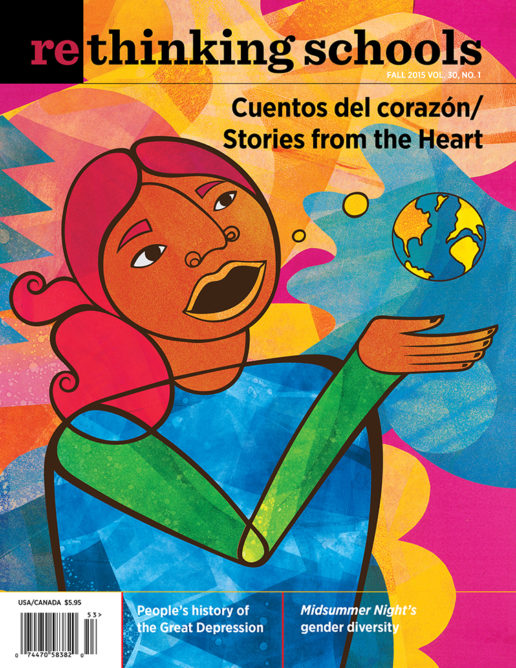Preview of Article:
Baby Mamas in Literature and Life
Illustrator: Bec Young
From folders emblazoned with “Jojo’s Mommy” to name tattoos on necks and arms, hints of my students’ children have always been present in my classroom. Without directly asking, by the end of the first week of school I know the parenting status of nearly all of my students. In the alternative school where I teach on Chicago’s West Side, between one-third and one-half of the students, depending on the semester, are pregnant or parenting. Although comments about parenting frequently wove their way into our classroom conversations, it wasn’t until I became pregnant that I realized the potential richness and importance of bringing this theme into the curriculum.
When I announced my pregnancy to my students in the spring of my 5th year of teaching here, I was expecting excitement, questions, and newfound opportunities to bond. I was not anticipating, however, the ways that my transition to motherhood would change my identity as a teacher and my relationship with my students. Sure, there were unsolicited daily comments on my changing body and suggestions for names. But, more surprising to me, students also showed extreme concern for my well-being, both physical (offers to carry materials) and mental (“Don’t stress her out!”). A believer in the reciprocal nature of learning, I had already noticed ways my students educated me about the world, but now many of them took on the expert role and filled me in on what I had to look forward toÑboth joyous and grossÑabout having a baby. Even students without children were very involved, as most of them lived with or frequently cared for young children. Perhaps it was because of the role reversal on this topic, but I started listening and responding to my students differently during this time.
I realized that parenting—specifically adolescent parenting —was what Paulo Freire called a “generative theme” of my students’ lives. Fraught with contradictions and controversy, this topic is generally excluded from the official curriculum of schools, except in the context of abstinence-only sex education. What, I wondered, would happen if schools embraced the messy realities instead of the usual deficit model? As an English/language arts teacher and believer in critical pedagogy, I decided my students and I should try. I designed an instructional unit with two essential questions in mind: How are stereotypes of parents, especially teen mothers, presented and countered in fiction and nonfiction texts? How do race, class, and gender intersect in discussions of parenthood? My learning goals focused on citing textual evidence to support claims about the representation of school-age mothers in U.S. culture, and analyzing texts of different genres and mediums for the portrayal of parents of different ages, races, and socioeconomic backgrounds.
Maya Angelou’s Letter to My Daughter
My school is part of a larger network of alternative high schools that enrolls 17- to 21-year-old students who have been kicked out, forced out, or dropped out of traditional high schools. Students attend for one semester, a year, or longer, depending on the number of credits they need to earn a diploma. The English courses are not organized by grade level or even skill level; instead, they are semester-long courses that resemble electives, with great teacher freedom to choose a genre or theme of focus. For several years, I have been teaching variations of “Women’s Literature,” focusing primarily on texts by African American authors. I organize the course thematically; “motherhood” is the second major unit. Drawing on some of the lessons from previous years, I reframed the first half of the motherhood unit to specifically explore adolescent motherhood.
We began the unit by journaling about birth. Students were invited to write about their own birth, giving birth, being present for a birth, or a story about someone else’s birth. Everyone had something to share, and we spent some time in a read-around. We listened as Shakira shared that she was a “miracle baby,” born extremely prematurely. Brandon made us laugh with his account of being born at home in the bathroom. Adrienne read aloud: “June 5, 2011, was the day I met my baby, the happiest day of my life. . . . She makes me so happy to be a teen mom. This is the first time I can say I did something good with my life.” Alisha described her niece’s birth as “disgusting but beautiful.”

